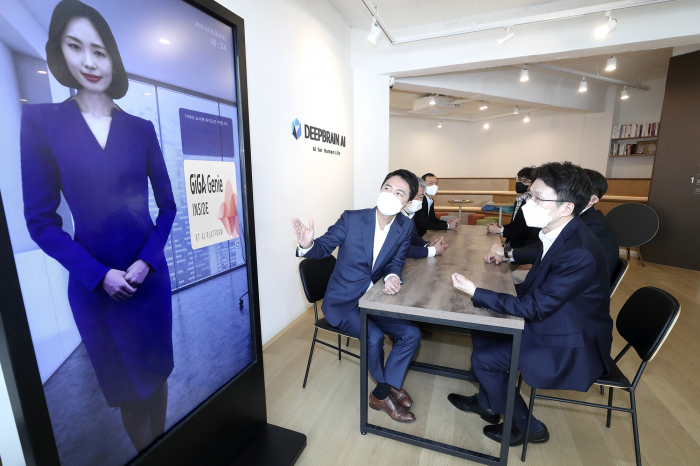
DeepBrain AI has worked with a number of South Korean conglomerates. Its founder Eric Jang speaks with KT Corp. about creating an AI human for the wireless carrier. Perhaps we will soon not be remembering our loved ones only through photos.Imagine a virtual rendition of the deceased speaking at his or her memorial. Imagine grandchildren listening to the voices of their late grandparents through virtual humans modeled after them. In recent years, the concept of "Digital Immortality" has become an important talking point for artificial intelligence (AI) firms. Tech giants in the United States, namely Microsoft Corp. and Amazon.com, Inc. have announced they are developing related technologies. In South Korea, conglomerates and AI startups alike are rushing to secure a first-mover advantage in the burgeoning market. FAMILY FIRSTSouth Korea’s AI-based video systems provider DeepBrain AI announced Monday it launched a business-to-customer (B2C) service that will virtually recreate deceased family members. The company, which creates lifelike AI, unveiled the latest service dubbed Re;memory. Previously, such services were only available as one-off customized offerings.The virtual human service based on AI technology recreates the clients’ late family members, by mimicking their every aspect – from their physique to their voice. Eric Jang, CEO of DeepBrain AI The service is for those that wish to immortalize their loved one’s story of life through a virtual human.The startup explained the idea behind Re;memory was to ease the pain of those who worry about aging parents or family members who are terminally ill.Once the first service aimed at recreating family members enters a stable phase, DeepBrain AI plans to expand its services to restore the clients’ children and friends. The AI technologies used in creating the service encompass natural language processing (NLP), voice recognition, and deep learning-based computer video generation. Its virtual human will be able to communicate with the user in real-time.Clients can “meet” the rendering of their loved ones at a Re;memory showroom for about 30 minutes per session.“We will strive to provide a service that applies the full breadth of the various AI technology to benefit everyone” the company’s CEO Eric Jang told the Korea Economic Daily. A conversation between an AI human and a real person (DeepBrain AI YouTube channel) STEP BY STEPThe process of creating the service begins with an interview of the human model while he or she is still alive. The company will create a number of scenarios based on the individual’s recollection of different episodes in their life, which the AI will study. DeepBrain AI will also tape the client for about three hours in a professional studio to attain his or her visual and voice data. Once the data collection stage is complete, the client can request to see the first sample. The service includes providing follow-up updates to the AI human, by speaking with the family members after their death.In late January, Amazon announced it is teaching its virtual assistant technology, Alexa, to mimic anyone’s voice, dead or alive, from a one-minute recording.At the company’s re:Mars conference in Last Vegas, Rohit Prasad, Amazon's head scientist for Alexa said, his team has been instructing the technology to pick up a voice from a short audio clip and produce longer audio output. Prasad said Alexa's ability to reproduce familiar voices could comfort those who lost their loved ones to the COVID-19 pandemic. "While AI can't eliminate that pain of loss it can make their memories last," he said.ETHICS & MARKETDespite the ongoing debate surrounding the ethics of rendering the deceased in the virtual space, the technology is advancing by the day. The AI-based renderings have become more precise and lifelike, and the cost of doing so is expected to come down significantly over time. “The price of AI human’s B2B services has declined by 30% since the beginning of its adoption so a similar service on creating such services based on the deceased will also go down,” an industry insider told The Korea Economic Daily. By Da Eun Choimax@hankyung.comJee Abbey Lee edited this article.
Most Read